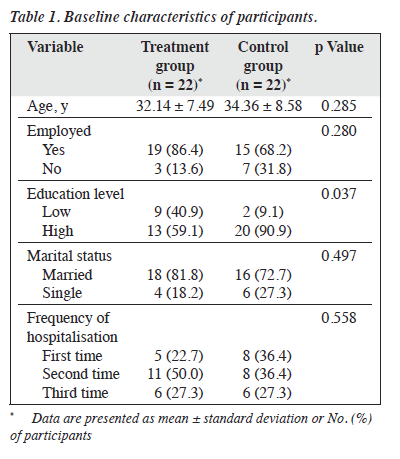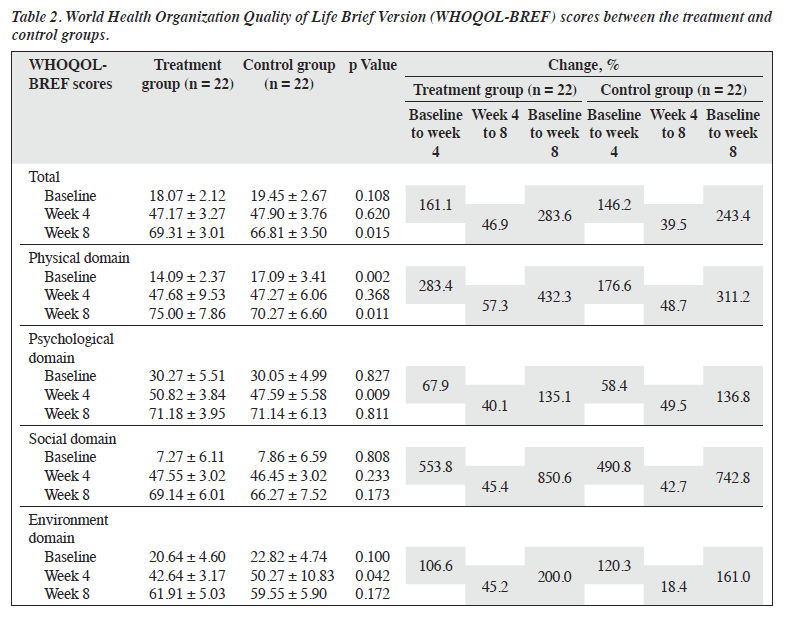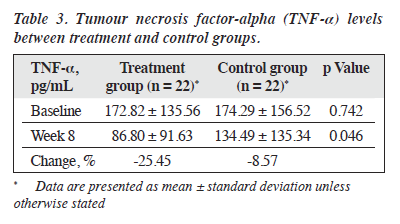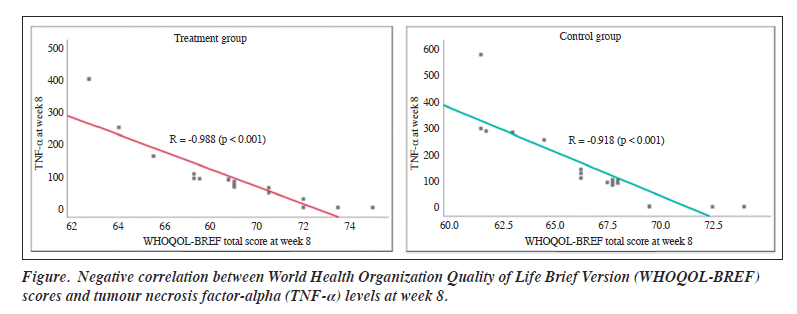East Asian Arch Psychiatry 2025;35:11-5 | https://doi.org/10.12809/eaap2455
ORIGINAL ARTICLE
Rismayanti, Limoa Erlyn, Syamsuddin Saidah, Seweng Arifin, Andi Mappaware Nasrudin, Renaldi Rinvil, Lisal Sonny Teddy
Abstract
Objectives: This study aimed to investigate the adjuvant treatment effect of Ajwa dates (Phoenix dactylifera L) on quality of life (QoL) and serum tumour necrosis factor-alpha (TNF-α) levels in patients with schizophrenia treated with risperidone.
Methods: Consecutive hospitalised patients aged 20 to 45 years who were diagnosed with schizophrenia, treated with risperidone at 4 to 6 mg/day, with a disease onset of ≤5 years, and had passed the acute phase were invited to participate. Participants were randomly and equally assigned to either the treatment or control group. The treatment group received risperidone as prescribed and seven Ajwa dates per day (ie, 60-80 g), whereas the control group received risperidone alone. Patient QoL was assessed by a psychiatrist in face-to-face interviews using the World Health Organization Quality of Life Brief Version (WHOQOL-BREF) at baseline, week 4, and week 8. Serum TNF-α levels were assessed using the enzyme-linked immunosorbent assay at baseline and week 8.
Results: In total, 44 participants were included in the analysis. The treatment and control groups were comparable in terms of baseline characteristics, except for education level (p = 0.037) and WHOQOL- BREF physical domain score (p = 0.002). At week 8, compared with the control group, the treatment group had higher total WHOQOL-BREF scores (69.3 vs 66.8, p = 0.015) and a greater percentage increase in scores (283.6% vs 243.4%), as well as lower TNF-α levels (86.8 vs 134.5 pg/mL, p = 0.046) and a greater percentage decrease in levels (-25.5% vs -8.6%). The WHOQOL-BREF scores were negatively correlated with serum TNF-α levels in both the treatment (r = -0.988, p < 0.001) and control (r = -0.918, p < 0.001) groups.
Conclusion: Ajwa dates have an adjuvant effect on improving QoL and reducing serum TNF-α levels in patients with schizophrenia treated with risperidone.
Key words: Quality of life; Risperidone; Schizophrenia; Tumor necrosis factor-alpha
Rismayanti, Department of Psychiatry, Faculty of Medicine, Hasanuddin University, Makassar, South Sulawesi, Indonesia
Limoa Erlyn, Department of Psychiatry, Faculty of Medicine, Hasanuddin University, Makassar, South Sulawesi, Indonesia
Syamsuddin Saidah, Department of Psychiatry, Faculty of Medicine, Hasanuddin University, Makassar, South Sulawesi, Indonesia
Seweng Arifin, Department of Biostatistics, Faculty of Public Health, Hasanuddin University, Makassar, South Sulawesi, Indonesia
Andi Mappaware Nasrudin, Department of Obstetrics and Gynaecology, Faculty of Medicine, Hasanuddin University, Makassar, South Sulawesi, Indonesia
Renaldi Rinvil, Department of Psychiatry, Faculty of Medicine, Hasanuddin University, Makassar, South Sulawesi, Indonesia
Lisal Sonny Teddy, Department of Psychiatry, Faculty of Medicine, Hasanuddin University, Makassar, South Sulawesi, Indonesia
Address for correspondence: Dr Limoa Erlyn, Department of Psychiatry, Faculty of Medicine, Hasanuddin University, Jl. Perintis Kemerdekaan Km. 10 Tamalanrea, Makassar, South Sulawesi, 90245, Indonesia. Email: erlynliem17@gmail.com
Submitted: 24 October 2024; Accepted: 6 January 2025
Mental disorders are associated with disability, reduced productivity, and significant treatment costs.1,2 They often begin with a psychopathological phase that is mild, pervasive, and easily transitioned to the next stage.3 Schizophrenia is a serious mental disorder affecting 1% of the population worldwide.4 More than 21 million people with schizophrenia are at high risk of dying at a young age.1
Schizophrenia is characterised by cognitive decline, hallucinations, delusions, disorganised thinking, social withdrawal,5-7 and a reduced ability to interact socially.8 These symptoms affect personal, social, and occupational functioning,9 leading to reduced life expectancy by approximately 15 years.10 According to the American Psychiatric Association, social dysfunction is a main criterion for schizophrenia and affects interpersonal relationships, work, and/or self-care.11 Medications for schizophrenia largely focus on specific neurotransmitters, although multi-neurotransmitter psychopathology is increasingly recognised.12 Risperidone is effective in managing positive and negative symptoms but is often inadequate in addressing functional and social impairment.13,14
People with schizophrenia face significant clinical and psychosocial challenges and have a lower quality of life (QoL).15-17 The World Health Organization Quality of Life Brief Version (WHOQOL-BREF) covers physical health, psychological wellbeing, social relationships, and relationships with one’s environment; it is commonly used to assess QoL.18,19
High levels of inflammatory markers such as tumour necrosis factor-alpha (TNF-α) may predict disease progression and response to treatment in schizophrenia.20 TNF-α is involved in neuroimmune regulation and autoimmunity, regulation of neuronal development, repair of neuronal damage, feedback signalling, differentiation of glial cells during early growth, and maintenance of normal brain morphology.21 Risperidone is not fully effective in addressing the functional and social impairments associated with schizophrenia.13,14 Therefore, a more effective and holistic therapeutic approach is needed.
The metabolite profiles of dates include all metabolites of amino acids, sugars, organic acids, phenolates, flavonoids, antioxidants, and macrominerals.22 Ajwa date fruit (Phoenix dactylifera L) contains various bioactive substances, such as phenolics and flavonoids, which have anti-inflammatory and antioxidant properties that can reduce oxidative stress and inflammation, potentially contributing to neuroprotection and improved immune regulation.23-25 This study aimed to investigate the adjuvant treatment effect of Ajwa dates on QoL and serum TNF-α levels in patients with schizophrenia treated with risperidone.
This randomised controlled trial was conducted between May 2023 and March 2024 (fasting periods during Ramadan were not included) at the Dadi Makassar Regional Mental Hospital, South Sulawesi, Indonesia. Consecutive hospitalised patients aged 20 to 45 years who were diagnosed with schizophrenia (based on ICD-10 criteria), treated with risperidone at 4 to 6 mg/day, with a disease onset of ≤5 years, and had passed the acute phase (with a score of <15 in the Positive and Negative Syndrome Scale– Excited Component) were invited to participate. Patients with physical comorbidities, a history of drug use, or treatment with anti-inflammatory, antioxidant, or antibiotic drugs were excluded.
Participants were randomly and equally assigned to either the treatment or control group. The treatment group received risperidone as prescribed and seven Ajwa dates per day (ie, 60-80 g), whereas the control group received risperidone alone. Patient QoL was assessed by a psychiatrist in face-to-face interviews using the WHOQOL-BREF at baseline, week 4, and week 8. Serum TNF-α levels were assessed using the enzyme-linked immunosorbent assay at baseline and week 8.
Statistical analyses were performed using SPSS (Windows version 24.0; IBM Corp, Armonk [NY], United States). The two groups were compared using the Chi- squared test, independent t test, or Mann-Whitney U test. Correlation between QoL and serum TNF-α levels was assessed using the Spearman correlation analysis. A p value of <0.05 was considered statistically significant.
In total, 44 participants were included in the analysis. The treatment and control groups were comparable in terms of baseline characteristics, except for education level (p = 0.037, Table 1) and WHOQOL-BREF physical domain score (p = 0.002, Table 2). At week 8, compared with the control group, the treatment group had higher total WHOQOL-BREF scores (69.3 vs 66.8, p = 0.015) and a greater percentage increase in scores (283.6% vs 243.4%), as well as lower TNF-α levels (86.8 vs 134.5 pg/mL, p = 0.046, Table 3) and a greater percentage decrease in levels (-25.5% vs -8.6%). The WHOQOL-BREF scores were negatively correlated with serum TNF-α levels in both the treatment (r = -0.988, p < 0.001) and control (r = -0.918, p < 0.001) groups (Figure).
The efficacy of risperidone in patients with schizophrenia is well documented.26-29 Nonetheless, supplementation with Ajwa dates resulted in better improvements in QoL and serum TNF-α levels in patients with schizophrenia treated with risperidone. Reduction of TNF-α levels may be associated with improvement of QoL in patients with schizophrenia. Ajwa dates contain rich nutrients and bioactive components, particularly anti-inflammatory compounds such as polyphenolic substances (ie, flavonoids, glycosides, and phenolics), which may improve symptoms in polyphenolic substances, particularly flavonoids, and may help suppress inflammatory effects.
Quercetin, a member of the flavonol subfamily, has a potential role in the treatment of various central nervous system disorders.33 Consumption of foods rich in flavonoids significantly improves cognitive abilities and prevents or delays the development of related neurodegenerative disorders. Therefore, the therapeutic value of natural products can be attributed to their various neuropharmacological modulatory properties.34
The dosage of seven dates per day was in line with previous studies.35,36 A meta-analysis of studies of prenatal issues showed that the number of dates required to achieve optimal effect is at least six.37 Eating seven dates per day is not contraindicated with any medication. Furthermore, eating seven dates in the morning has a spiritual context for Muslims; Prophet Muhammad said “whoever eats seven Ajwa dates in the morning will not be harmed by poison or magic on that day”.
This study has several limitations. The sample size was small due to difficulties in recruiting patients with schizophrenia. It used an open-label design, which may have led to potential biases. There was no placebo- controlled group. The effect of Ajwa dates on schizophrenia may have been direct or indirect (ie, by enhancing the effect of risperidone). Patients were recruited from a single hospital, and therefore the results of this study may not be generalisable to patients with other sociodemographic backgrounds or patients treated at other hospitals in Indonesia.
Ajwa dates have an adjuvant effect on improving QoL and reducing serum TNF-α levels in patients with schizophrenia treated with risperidone.
All authors designed the study, acquired the data, analysed the data, drafted the manuscript, and critically revised the manuscript for important intellectual content. All authors had full access to the data, contributed to the study, approved the final version for publication, and take responsibility for its accuracy and integrity.
All authors have disclosed no conflicts of interest.
This study received no specific grant from any funding agency in the public, commercial, or not-for-profit sectors.
All data generated or analysed during the present study are available from the corresponding author on reasonable request.
This study was approved by the Biomedical Research Ethics Committee on Humans, Faculty of Medicine, Hasanuddin University (reference: 688/UN4.6.4.5.31/ PP36/ 2023). This study was registered in the Thai Clinical Trials Registry (reference: TCTR20241117003). The participants provided written informed consent for all treatments and procedures and for publication.
We thank Dr Andi Agus Mumang for providing suggestions to improve the manuscript.
- Riskesdas. Laporan Nasional Riskesdas 2018: Hasil Utama Riset Kesehatan Dasar. Accessed 1 July 2024. Available from: https://repository.badankebijakan.kemkes.go.id/id/eprint/3514.
- Mumang AA, Liaury K, Syamsuddin S, et al. Socio-economic- demographic determinants of depression in Indonesia: a hospital- based study. PLoS One 2020;15:e0244108. Crossref
- van der Tuin S, Balafas SE, Oldehinkel AJ, Wit EC, Booij SH, Wigman JTW. Dynamic symptom networks across different at-risk stages for psychosis: an individual and transdiagnostic perspective. Schizophr Res 2022;239:95-102. Crossref
- Stępnicki P, Kondej M, Kaczor AA. Current concepts and treatments of schizophrenia. Molecules 2018;23:2087. Crossref
- Stafford MR, Mayo-Wilson E, Loucas CE, et al. Efficacy and safety of pharmacological and psychological interventions for the treatment of psychosis and schizophrenia in children, adolescents and young adults: a systematic review and meta-analysis. PLoS One 2015;10:e0117166. Crossref
- Englisch S, Zink M. Treatment-resistant schizophrenia: evidence- based strategies. Mens Sana Monogr 2012;10:20-32. Crossref
- Ainsah O, Nurulwafa H, Osman CB. Symptom presentation in patients with acute schizophrenia: comparison in three major Malaysian ethnic groups. East Asian Arch Psychiatry 2008;18:62-8.
- Kumari S, Dahuja S, Singh U. Association of clinical factors with socio-occupational functioning among individuals with schizophrenia. Ind Psychiatry J 2023;32:65-70. Crossref
- Jana AK. Clinical and sociodemographic associates of remission from positive symptoms in schizophrenia. East Asian Arch Psychiatry 2021;31:13-8. Crossref
- McCutcheon RA, Krystal JH, Howes OD. Dopamine and glutamate in schizophrenia: biology, symptoms and treatment. World Psychiatry 2020;19:15-33. Crossref
- 1 Dziwota E, Stepulak MZ, Włoszczak-Szubzda A, Olajossy M. Social functioning and the quality of life of patients diagnosed with schizophrenia. Ann Agric Environ Med 2018;25:50-5. Crossref
- Cai HL, Li HD, Yan XZ, et al. Metabolomic analysis of biochemical changes in the plasma and urine of first-episode neuroleptic-naïve schizophrenia patients after treatment with risperidone. J Proteome Res 2012;11:4338-50. Crossref
- Dixon LB, Dickerson F, Bellack AS, et al. The 2009 schizophrenia PORT psychosocial treatment recommendations and summary statements. Schizophr Bull 2010;36:48-70. Crossref
- Zhou Z, Zhu Y, Wang J, Zhu H. Risperidone improves interpersonal perception and executive function in patients with schizophrenia. Neuropsychiatr Dis Treat 2016;13:101-7. Crossref
- Shafie S, Samari E, Jeyagurunathan A, et al. Gender difference in quality of life (QoL) among outpatients with schizophrenia in a tertiary care setting. BMC Psychiatry 2021;21:61. Crossref
- Osman CB, Badli MM, Ainsah O, et al. The comparison of quality of life among patients with schizophrenia and major mood disorder in remission in Hospital Universiti Kebangsaan Malaysia, Kuala Lumpur. East Asian Arch Psychiatry 2009;19:4-10.
- Solanki RK, Singh P, Midha A, Chugh K, Swami MK. Disability and quality of life in schizophrenia and obsessive compulsive disorder: a cross-sectional comparative study. East Asian Arch Psychiatry 2010;20:7-13.
- World Health Organization. The World Health Organization Quality of Life (WHOQOL)-BREF. Accessed 01 July 2024. Available from: https://www.who.int/tools/whoqol/whoqol-bref/docs/default-source/publishing-policies/whoqol-bref/indonesian-whoqol-bref.
- Francisquini PD, Soares MH, Machado FP, Luis MAV, Martins JT. Relationship between well-being, quality of life and hope in family caregivers of schizophrenic people. Rev Bras Enferm 2020;73 Suppl 1:e20190359. Crossref
- Lin P, Sun J, Lou X, et al. Consensus on potential biomarkers developed for use in clinical tests for schizophrenia. Gen Psychiatr 2022;35:e100685. Crossref
- Vauth R, Carpiniello B, Turczyński J, et al. Relationship between clinical outcomes measures and personal and social performance functioning in a prospective, interventional study in schizophrenia. Int J Methods Psychiatr Res 2021;30:e1855. Crossref
- Hamad I, AbdElgawad H, Al Jaouni S, et al. Metabolic analysis of various date palm fruit (Phoenix dactylifera L.) cultivars from Saudi Arabia to assess their nutritional quality. Molecules 2015;20:13620-41. Crossref
- Alqarni MMM, Osman MA, Al-Tamimi DS, et al. Antioxidant and antihyperlipidemic effects of Ajwa date (Phoenix dactylifera L.) extracts in rats fed a cholesterol-rich diet. J Food Biochem 2019;43:e12933. Crossref
- Khalid S, Khalid N, Khan RS, Ahmed H, Ahmad A. A review on chemistry and pharmacology of Ajwa date fruit and pit. Trends Food Sci Technol 2017;63:60-9. Crossref
- Abdelghffar EA, Obaid WA, Mohammedsaleh ZM, Ouchari W, Eldahshan OA, Sobeh M. Ajwa dates (Phoenix dactylifera L.) attenuate cisplatin-induced nephrotoxicity in rats via augmenting Nrf2, modulating NADPH oxidase-4 and mitigating inflammatory/apoptotic mediators. Biomed Pharmacother 2022;156:113836. Crossref
- Lindenmayer JP, Eerdekens E, Berry SA, Eerdekens M. Safety and efficacy of long-acting risperidone in schizophrenia: a 12-week, multicenter, open-label study in stable patients switched from typical and atypical oral antipsychotics. J Clin Psychiatry 2004;65:1084-9. Crossref
- Correll CU, Litman RE, Filts Y, et al. Efficacy and safety of once- monthly Risperidone ISM® in schizophrenic patients with an acute exacerbation. NPJ Schizophr 2020;6:37. Crossref
- Himei A, Okamura T. Evaluation of the clinical efficacy of risperidone for untreated and treated cases of schizophrenia from various aspects. Psychiatry Clin Neurosci 2005;59:556-62. Crossref
- Macfadden W, DeSouza C, Crivera C, et al. Assessment of effectiveness measures in patients with schizophrenia initiated on risperidone long-acting therapy: the SOURCE study results. BMC Psychiatry 2011;11:167. Crossref
- Zhang CR, Aldosari SA, Vidyasagar PS, Nair KM, Nair MG. Antioxidant and anti-inflammatory assays confirm bioactive compounds in Ajwa date fruit. J Agric Food Chem 2013;61:5834-40. Crossref
- Mauludiyana S, Aryati, Dachlan YP, Saputro ID. Anti-inflammatory and antibacterial potential of Ajwa date (Phoenix dactylifera L.) extract in burn infection. J Adv Pharm Technol Res 2023;14:161-5. Crossref
- Luo Y, He H, Zhang J, Ou Y, Fan N. Changes in serum TNF-α, IL-18, and IL-6 concentrations in patients with chronic schizophrenia at admission and at discharge. Compr Psychiatry 2019;90:82-7. Crossref
- Wróbel-Biedrawa D, Grabowska K, Galanty A, Sobolewska D, Podolak I. A flavonoid on the brain: quercetin as a potential therapeutic agent in central nervous system disorders. Life (Basel) 2022;12:591. Crossref
- Ayaz M, Sadiq A, Junaid M, et al. Flavonoids as prospective neuroprotectants and their therapeutic propensity in aging associated neurological disorders. Front Aging Neurosci 2019;11:155. Crossref
- Royani I, As’ad S, Mappaware NA, Hatta M, Rabia. Effect of Ajwa dates consumption to inhibit the progression of preeclampsia threats on mean arterial pressure and roll-over test. Biomed Res Int 2019;2019:2917895. Crossref
- Al-Kuran O, Al-Mehaisen L, Bawadi H, Beitawi S, Amarin Z. The effect of late pregnancy consumption of date fruit on labour and delivery. J Obstet Gynaecol 2011;31:29-31. Crossref
- Salajegheh Z, Nasiri M, Imanipour M, et al. Is oral consumption of dates (Phoenix dactylifera L. fruit) in the peripartum period effective and safe integrative care to facilitate childbirth and improve perinatal outcomes: a comprehensive revised systematic review and dose-response meta- analysis. BMC Pregnancy Childbirth 2024;24:12. Crossref






